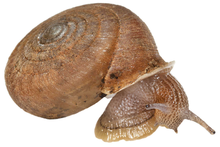Gudeodiscus giardi
| Gudeodiscus giardi | |
|---|---|

| |
| a live Gudeodiscus giardi giardi | |
| Scientific classification | |
| Kingdom: | |
| Phylum: | |
| Class: | |
| (unranked): | clade Heterobranchia
clade Euthyneura |
| Superfamily: | |
| Family: | |
| Genus: | Gudeodiscus
|
| Subgenus: | Gudeodiscus[1]
|
| Species: | G. giardi
|
| Binomial name | |
| Gudeodiscus giardi (, 1898)[2]
| |
| Synonyms[1] | |
|
Plectopylis Giardi Fischer, 1898 | |
Gudeodiscus giardi is a species of air-breathing land snail, a terrestrial pulmonate gastropod mollusk in the family Plectopylidae.
This species was described by French zoologist (1865-1916) (son of Paul-Henri Fischer) in 1898.
Subspecies[]
- Gudeodiscus giardi giardi (Fischer, 1898)
- Gudeodiscus giardi oharai Páll-Gergely, 2013[3]
- Gudeodiscus giardi szekeresi Páll-Gergely & Hunyadi, 2013[3]
The specific name giardi is in honor of French zoologist Alfred Mathieu Giard.[2] The subspecific name oharai is in honor of the collector Kenji Ohara.[3] The subspecific name szekeresi is in honor of the malacologist Miklós Szekeres.[3]
Distribution[]
The distribution of Gudeodiscus giardi includes Cao Bằng Province and the northern part of Lạng Sơn Province in Vietnam[1] and western Guangxi in China.[3]
The type locality of Gudeodiscus giardi giardi is "".[2][1] Gudeodiscus giardi giardi lives in Vietnam and China.[3] Gudeodiscus giardi oharai lives in are north of Nanning in Western Guangxi, China.[3] Gudeodiscus giardi szekeresi live in the type locality only: Langur Reserve, 25 km southeast of Chongzuo, China.[3]
Description[]
The most important shell characters for identification of Gudeodiscus giardi include: high and rather sharply defined shell shape, narrow umbilicus (for the genus Gudeodiscus) and thick peristome.[1]
The size of the shell is small to large.[1] The shape of the shell is high and rather sharply defined.[1] The color of the shell is brownish, but some Chinese populations are small and yellow and translucent.[1] The sculpture is usually finely reticulated, that is resulting in a matt surface.[1] The umbilicus is deep.[1] Apertural lip, callus and apertural fold are very well-developed (callus is very much elevated).[1] Parietal wall has two lamellae.[1] The anterior lamella is usually connected to the lower plica.[1] Middle palatal plicae are short, depressed Z-shaped, or almost vertical, sometimes connected to each other.[1] The width of the shell 13.5–21.3 mm.[1] The height of the shell is 7.0–12.1 mm.[1]
The radula of Gudeodiscus giardi has 12 lateral teeth and 15 marginal teeth.[1] The size of the central tooth is as large as the ectocone of the first lateral.[1] The shape of the first lateral is rhomboid and pointed.[1] Marginal teeth are bicuspid or tricuspid with blunt inner cusp and shallow incision between the inner two cusps.[1]
The reproductive system of specimen from China was described by Páll-Gergely & Asami in 2014[4] and from Vietnam by Páll-Gergely et al. in 2015.[1] Embryos were not recorded in the uterus.[1] There were recorded hook-like or flat and oval calcareous granules on the internal surface of penis.[1]
Ecology[]
It is a ground-dwelling species as all other plectopylid snails in Vietnam.[1]
It co-occur with other plectopylids in Vietnam: with Gudeodiscus anceyi, Gudeodiscus francoisi, Sicradiscus mansuyi and with Gudeodiscus suprafilaris.[1] Gudeodiscus phlyarius live at geographically close sites to Gudeodiscus giardi.[1]
References[]
This article incorporates Creative Commons (CC-BY-4.0) text from the reference[1]
- ^ a b c d e f g h i j k l m n o p q r s t u v w x y z aa Páll-Gergely B., Hunyadi A., Ablett J., Luong Van H., Naggs F. & Asami T. (2015). "Systematics of the family Plectopylidae in Vietnam with additional information on Chinese taxa (Gastropoda, Pulmonata, Stylommatophora)". ZooKeys 473: 1–118. doi:10.3897/zookeys.473.8659.
- ^ a b c (in French) Fischer H. (1898). "Notes sur la Faune du Haut-Tonkin V. Description d’une Espèce Nouvelle de Plectopylis". Bulletin Biologique de la France et de la Belgique 28: 310–338. pages 320–322, plate 17, figures 17–21.
- ^ a b c d e f g h Páll-Gergely B. & Hunyadi A. (2013). "The family Plectopylidae Möllendorff 1898 in China (Gastropoda, Pulmonata)". Archiv für Molluskenkunde 142(1): 1-66. doi:10.1127/arch.moll/1869-0963/142/001-066.
- ^ Páll-Gergely B. & Asami T. (2014). "Additional information on the distribution, anatomy and systematics of living and fossil Chinese Plectopylidae (Gastropoda: Pulmonata)". Genus 25(3): 527–564.
External links[]
- Plectopylidae
- Gastropods described in 1898